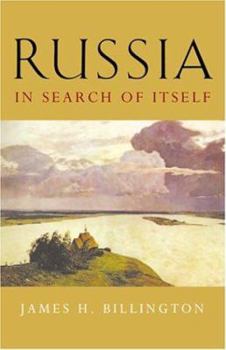Russia in Search of Itself
Select Format
Select Condition 
Book Overview
In the turbulent decade since the collapse of the Soviet Union, conditions have worsened considerably for many Russians, and a wide-ranging debate has raged over the nature and destiny of their country. In Russia in Search of Itself , James H. Billington, the Librarian of Congress and a noted expert on Russia, examines the efforts of a proud but troubled nation to find a post-Soviet identity. The agenda has not been controlled from the top-down and...
Format:Hardcover
Language:English
ISBN:0801879760
ISBN13:9780801879760
Release Date:March 2004
Publisher:Woodrow Wilson Center Press
Length:256 Pages
Weight:0.05 lbs.
Dimensions:0.9" x 5.8" x 8.9"
Age Range:18 years and up
Grade Range:Postsecondary and higher
Customer Reviews
4 ratings
A good review of more or less prominent ideologies in Russia
Published by Thriftbooks.com User , 17 years ago
Librarian of Congress James Billington does a pretty decent job at tracing the ideological parable of the Soviet Union and the ideological vacuum in the beginning years of the Russian Federation. Billington reviews lots of both major and minor authors in modern-day Russia to draw a picture of the currents of thought that will shape the future of the country. Two main problems I see with the book: 1) Billington probably uses the "matryoshka" metaphor so often as to make it dull by about page 150; 2)The point of view from which the author analyzes Russia and its ideological development is a bit too American for my taste. Of course, the book is written for an American audience, but it would have been helpful to rid the book of some (very little, yet altogether unnecessary) patriotism. Overall, interesting reading for those who care about the direction that Russia is taking and the direction it should take.
Dives deep into the Russian mindset
Published by Thriftbooks.com User , 18 years ago
Russian studies, once the king of international relations, has fallen by the wayside since the end of the Cold War. The threat of Islamic terrorism, the economic potential of Asia, and the crisis of the developing world have overshadowed Russian studies. Despite this fall, James Billington lays out a concise treatise on why, despite being deeply studied during the Cold War, we know so little of the Russians and why we should continue to follow its evolution. With the lens of "evil communism" removed from the Russian stereotype, the author attempts to make sense of the complex, depressed, and overly emotional Russian identity. As Russia stumbles into the 21st century, its core question remains, is it a European or an Asian power, or is it something entirely unique. Billington is one of the American grand masters of Russian studies, his fame and connections gives him easy access to the remnants of Russia's once important intelligentsia. What Billington finds is a lost and confused people, who realize they were betrayed by communism, but feel equally fooled by democracy and economic shock therapy. Billington's work, while deeply though provoking, is not for the novice of Russian culture. A solid foundation in Russian hisotry is required. His preference for academic elite causes the voice the average Russian to go missing. While Russian studies have lost some of its luster, the mere size, nuclear power, and massive natural resource base of Russia will cause it to be a area of prominent concern to U.S. national security for generations. For this reason alone, a firm understanding of the Russian national character is critical in any attempt to predict or explain Russia's future. Billington's insight into the true nature of the Russian soul is without equal.
Thoughtful, fair and balanced.
Published by Thriftbooks.com User , 19 years ago
Thoughtful, fair and balanced. Here is a fascinating work well worth referring to again and again. Mr. Billington knows his subject. His witnessing of the coup's 76 fateful hours in 1991 and the mysterious inaction of the 5.5 million-strong Russian army read like a thriller. As grandmas talked to the drivers of the tanks sitting in front of the White House, I realized I was reading a true history. Mr. Billington is not afraid to comment on the seemingly spiritually co-operative side of the Russian mentality. Given that, and the prolific but welcome quoting of Russian philosophers, leaders, authorities and poets, I was somewhat surprised at the glaring omission of even the slightest mention of Maxim Gorky, the famous writer who embraced Leninism, then back-pedaled years later before mysteriously "dying" like many of Stalin's targets. I recall reading how Gorky wrote about his wish for the future of mankind as being natural for each one to accept the feeling of personal responsibility for everything that is created by him and around him. I think that same message comes through in this book. And,for those who wonder what the Russian words mean on the little boy's hat on the back cover photo,they say: "I want to be like my grandpa". Five stars for this objective and honest work.
A Struggle to Find Itself.
Published by Thriftbooks.com User , 20 years ago
Dr. Billington has been the Librarian of Congress since 1987. For at least thirty years he has studied Russia, both as a historian and cultural specialist. This is his sixth book on Russia.==This book is about how Russians have been thinking about their nation since the collapse. It is not a history of Russia, but an attempt to understand how the heirs of a great tradition are grappling under new conditions of freedom.In many ways, the average Russian is worse off than before the collapse. How will this translate into voting for leaders in the coming years? Will Russia attempt to revert to its more authoritarian past? Can the country get through the times that it is now seeing and become an exemplory democracy? The book presents some interesting views based on talking with many Russian people.






